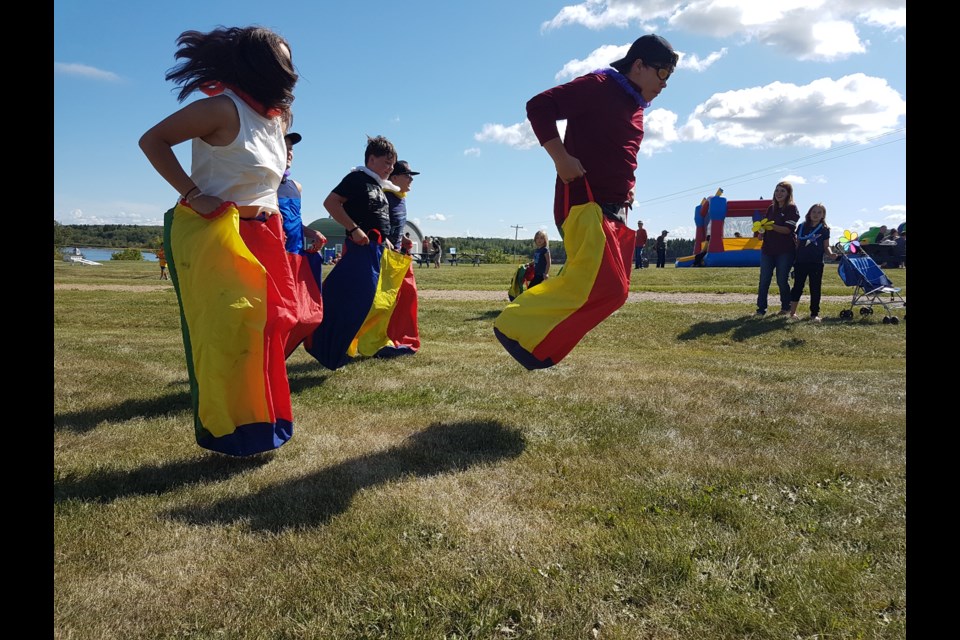LAC LA BICHE — After forgoing celebratory events on July 1, volunteers with the Lac La Biche Mission Historical Society welcomed the public to the first Mission Family Picnic on Aug. 28.
The family-oriented event drew in roughly 200 youth and adults on the sunny afternoon. Upon arrival, youth received a colourful lei necklace and an activity passport, designed to encourage families to participate in all the activities taking place around the Mission’s grounds.
To fill the picnic passports, kids had to take part in a bean bag game, a beading workshop, a sack race, a mitt making workshop, visit the Métis culture booth and jump in one of two bouncy castles.
Popular activities drawing in the largest crowds included the beading workshop, the bouncy castle obstacle course and sack races that ran in three heats, starting with younger children, older children and then those over 14.
If picnic attendees were not filled up by the free hot dogs, chips and cupcakes available, there was more to be eaten for those willing to compete in a watermelon eating contest. The contest, again had three heats, with the youngest kids eating what they could in 40 seconds, older kids having 30 seconds to chow down and adults receiving 25 seconds to make their juicy fruit disappear. The winners received a toy of their choice and half a watermelon.
The first-time picnic was organized in a joint effort between the Lac La Biche County, Métis Nation Region 1 and the Lac La Biche Mission. The funding to make the event possible, came from the federal Celebrate Canada grant, which is typically used by non-profit organizations, businesses and municipalities to celebrate Canada Day.
However, due to the various levels of health restrictions throughout the country in July and the discovery of mass unmarked graves at the sites of former residential schools, the government allowed organizers to postpone events that celebrated values of multiculturalism and national identity without losing their event funding.
Acknowledging the past
Taking into consideration the Mission’s own history as a former residential school, which operated for a period of five years between 1893 until 1899 before closing, the historical society’s board and the Mission’s Site Administrator Louis Poulin-Markle, choose to forgo Canada Day Celebrations that usually takes place at the Mission.
Some elements of a typical Canada Day event made an appearance at the picnic, such as food and a focus on family, but in terms of tone and activity content, the real emphasis was on the kids, said Poulin-Markle.
“(Board members) had talked about the importance of having children on the site and focusing on the partnerships we've tried to build and everything just kind of started falling into place with the idea of the bouncy castles and just doubling down on the fun aspect,” he said. “I think it's a really nice combination and allows kids to have fun and then forget themselves a bit, but then also you throw in a bit of educational stuff right at the end to make sure they leave with having learned something.”
George L’Heureux, Chair of the Mission Historical Site Board and councillor of Ward 2, expressed excitement at hosting an annual end-of-summer family picnic moving forward.
“Absolutely, I hope it goes forward every year because it's a fantastic event and the kids just love it,” said L’Heureux.
Making a point to acknowledge that the Lac La Biche Mission is located on Treaty Six territory and is the homeland of the Métis and First Nation Peoples, L’Heureux described the purpose of making the event youth and family oriented.
“It's very focused on (youth) because of the news that there was lost children. It's an opportunity for children to come out here and have fun, intertwine, remember and respect the fact that these children were lost,” he said.
Preserving history
For Mary Lehoux, a board member and volunteer with Mission for more than 10 years, encouraging individuals and family to experience the truth and history between Canada and First Nation Peoples by visiting historic sites and viewing artifacts is a part of healing and reconciliation.
“The next generations to come, they're going to have a well-preserved place to come to,” she said. “I like that in the future, the children are going to have something.”
Being Métis and growing up on the trapline and attending residential school herself, Lehoux says, “Sharing my culture is like sharing my home — sharing myself.”
“Because I also am a residential school survivor, I know exactly how the people are feeling and working here actually helps me... It's kind of different for me because I know the history that happened here. We don't know exactly how kids got treated or anything, but it just makes me happy to know that we are taking care of it now and not leaving it and sweeping it under the rug,” she says.
During the Lac La Biche Mission Historical Site’s off-season, more effort will be redirected to accessing federal and provincial grants to conduct preliminary research required to being searching for any unmarked graves that may exist. However, the process to have the Misson’s grounds searched will likely take a couple of years, according to Poulin-Markle, the site administrator.



